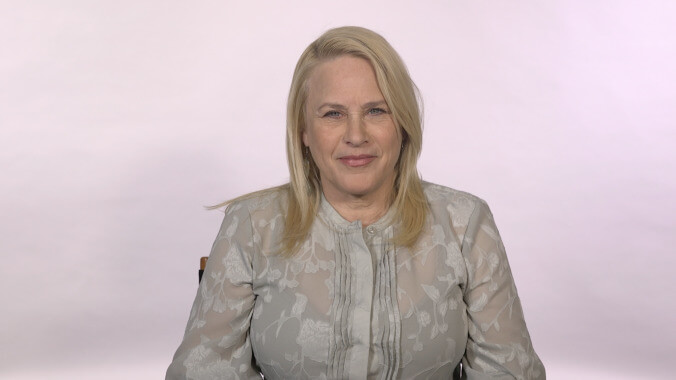Patricia Arquette talks about dystopian reality in Severance amid production halt
Patricia Arquette talks to The A.V. Club about Severance, Ben Stiller, the writers strike, and artificial intelligence

Patricia Arquette was looking for something a little “wilder and less controlled after Severance” when she signed on for High Desert, her new comedy on Apple TV+. The latest project reunites her once again with Ben Stiller, who serves as the show’s producer. “I think Ben and I, I guess we have similar taste, or I think we mutually respect each other’s taste for sure,” she tells The A.V. Club. “And I just love him as an artist and his vision, and I guess it’s similar, likewise. I don’t know.”
“It’s really hard to pick” a favorite project with Stiller, she says, “because it was fun working with Ben as an actor on Flirting With Disaster, and then Escape At Dannemora had its own tone, that was a really interesting character. And then Severance is very structured, strict, and then we have High Desert which is wild and madcap. It’s like a little cyclone that’s going all the time.”
Stiller and writer Dan Erickson helped her balance the dual personalities of Harmony Cobel and Mrs. Selvig on Severance, though at first the distinction between the two was “kind of nebulous.” “But then once I kind of discovered that Ms. Selvig was kind of trying on, ‘What is it to be a person who didn’t grow up in this labyrinth of a corporation?’ What is it like to try on, ‘Oh, we’re chummy neighbors,’ ‘Oh, we’re making jokes with one another,’ How does that feel?” Arquette muses. “She’s kind of experimenting with being a human a little bit, and what does it feel like to be free of all those rules.”
When The A.V. Club asks for a tease of the second season, however, Mrs. Selvig goes out the window. “Every time somebody asks me that, my Cobel part comes out, and I want to punish them,” she laughs. “Or I wanna lie to them. I can tell you this. I think people will be very surprised.”
Severance is one of many series that have been disrupted by the Writers Guild of America strike. “As an actor, we don’t really have anything if we don’t have great material to work with. It’s so intimate, our relationship with writers,” Arquette says. “I definitely want writers to be heard and respected. I wanna hear what they need, and make sure that we’re all coming together, in this new world with all these streaming platforms and everything moving as quickly as it is, that we have writers’ rooms available that are able to give us the best material we can work with.”
One topic that is at the forefront of striking workers’ concerns is artificial intelligence, which Arquette agrees “is a very, very important” conversation. “Not just for writers, definitely for actors, definitely for directors, and DPs, and everybody. Special effects people, craft service people, grips, electric, everyone,” she declares. “But I also think that as film lovers, it’s very dangerous. Because what people are gonna put into that mechanism to spit out a movie, it’s not gonna be your most creative material. It’s gonna be some big comic book blockbuster thing, because that’s what these companies are gonna wanna make. They’re gonna wanna make the most money they possibly can.”
“We’re gonna lose the little movie of the little girl whose dad’s a boxer; the little movie of the old man with Alzheimer’s who keeps forgetting his wife’s name; all these interesting films,” Arquette continues, concluding with a point that’s hard to argue: “We need humans to continue to make movies and television.”